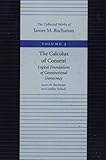The calculus of consent : logical foundations of constitutional democracy / James M. Buchanan and Gordon Tullock.
Series: Buchanan, James M. Works ; v. 3.Publication details: Indianapolis : Liberty Fund, c1999.Description: xx, 356 p. : ill. ; 24 cmISBN:- 0865972176 (alk. paper)
- 0865972184 (pbk. : alk. paper)
- 320.973 BUC 21
- JC423 .B86 1999
| Item type | Current library | Shelving location | Call number | Status | Date due | Barcode |
|---|---|---|---|---|---|---|
 BOOKs
BOOKs
|
National Law School | MPP Section | 320.973 BUC (Browse shelf(Opens below)) | Available | 37793 |
Browsing National Law School shelves, Shelving location: MPP Section Close shelf browser (Hides shelf browser)

|

|

|

|

|

|

|
||
| 320.954 ROY Listening to grasshoppers : Field notes on democracy | 320.9548 PIN The fall and rise of Telangana / | 320.95496 ARO Democratisation in the Himalayas | 320.973 BUC The calculus of consent : | 320.973 DWO Is democracy possible here | 320.97309 ETZ The new normal | 321.07 LEE Anarchy unbound : why self-governance works better than you think |
Originally published: Ann Arbor : University of Michigan Press, [1962]. With new foreword, coauthor note, and indexes.
Includes bibliographical references and indexes.
reword, "[this book] is a radical departure from the way democracies conduct their business. The Calculus is already a book for the ages."
This classic work analyzes the political organization of a free society through the lens of the economic organization of society. The authors acknowledge their unease as economists in analyzing the political organization, but they take the risk of forging into unfamiliar territory because they believe the benefits of their perspective will bear much fruit.
As the authors state, their objective in this book is "to analyze the calculus of the rational individual when he is faced with questions of constitutional choice. . . . We examine the [choice] process extensively only with reference to the problem of decision-making rules."
The authors describe their approach as "economic individualism." They believe that economists have explored individual choice extensively in the market sector while social scientists have largely ignored the dynamics of individual decision-making in the dynamics of forming group action in the public sector.
Written in the early 1960s, The Calculus of Consent has become a bulwark of the public choice movement for which James M. Buchanan is so justly famous.
James M. Buchanan (1919-2013) was an eminent economist who won the Alfred Nobel Memorial Prize in Economic Sciences in 1986 and was considered one of the greatest scholars of liberty in the twentieth century.

There are no comments on this title.